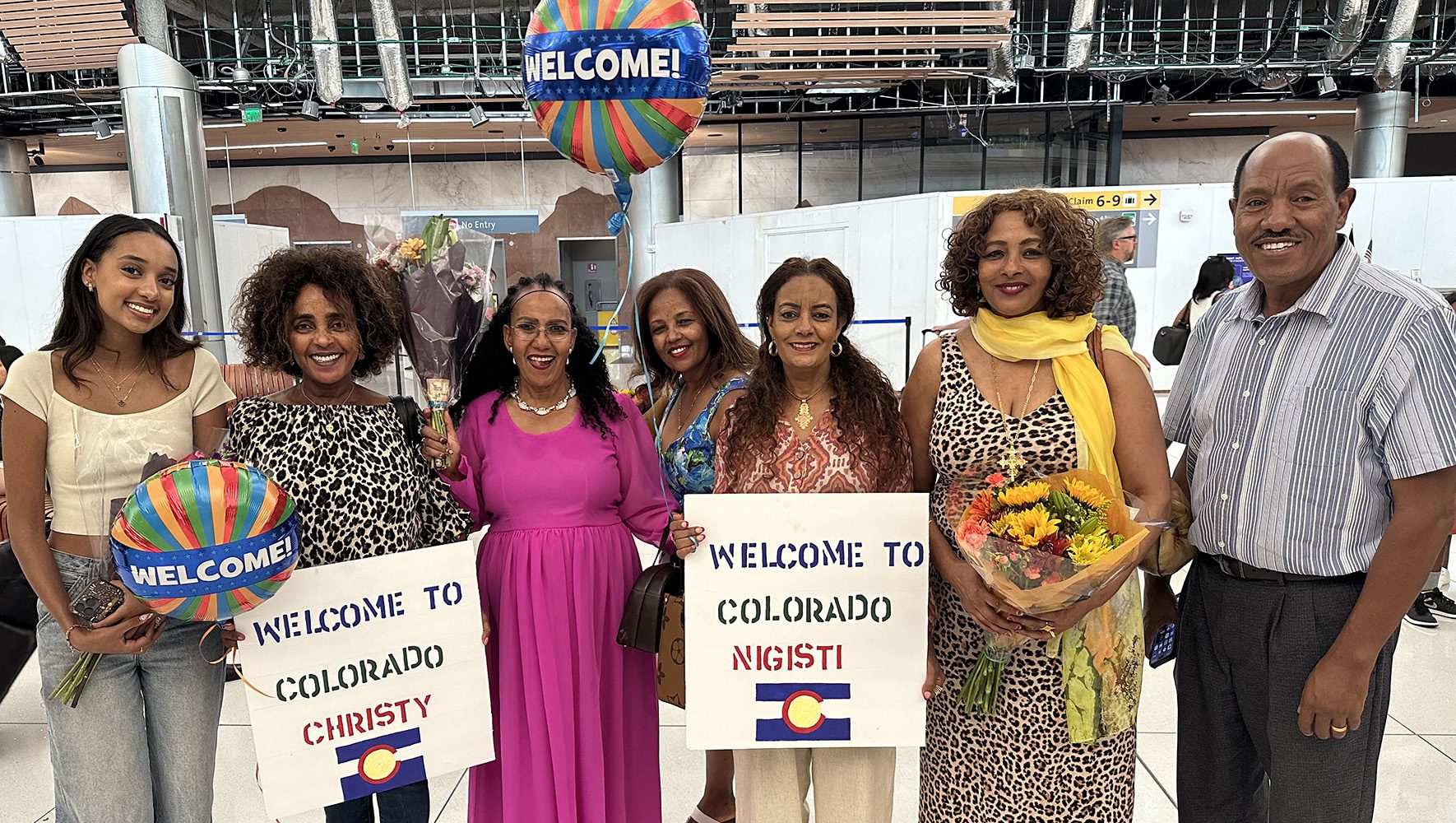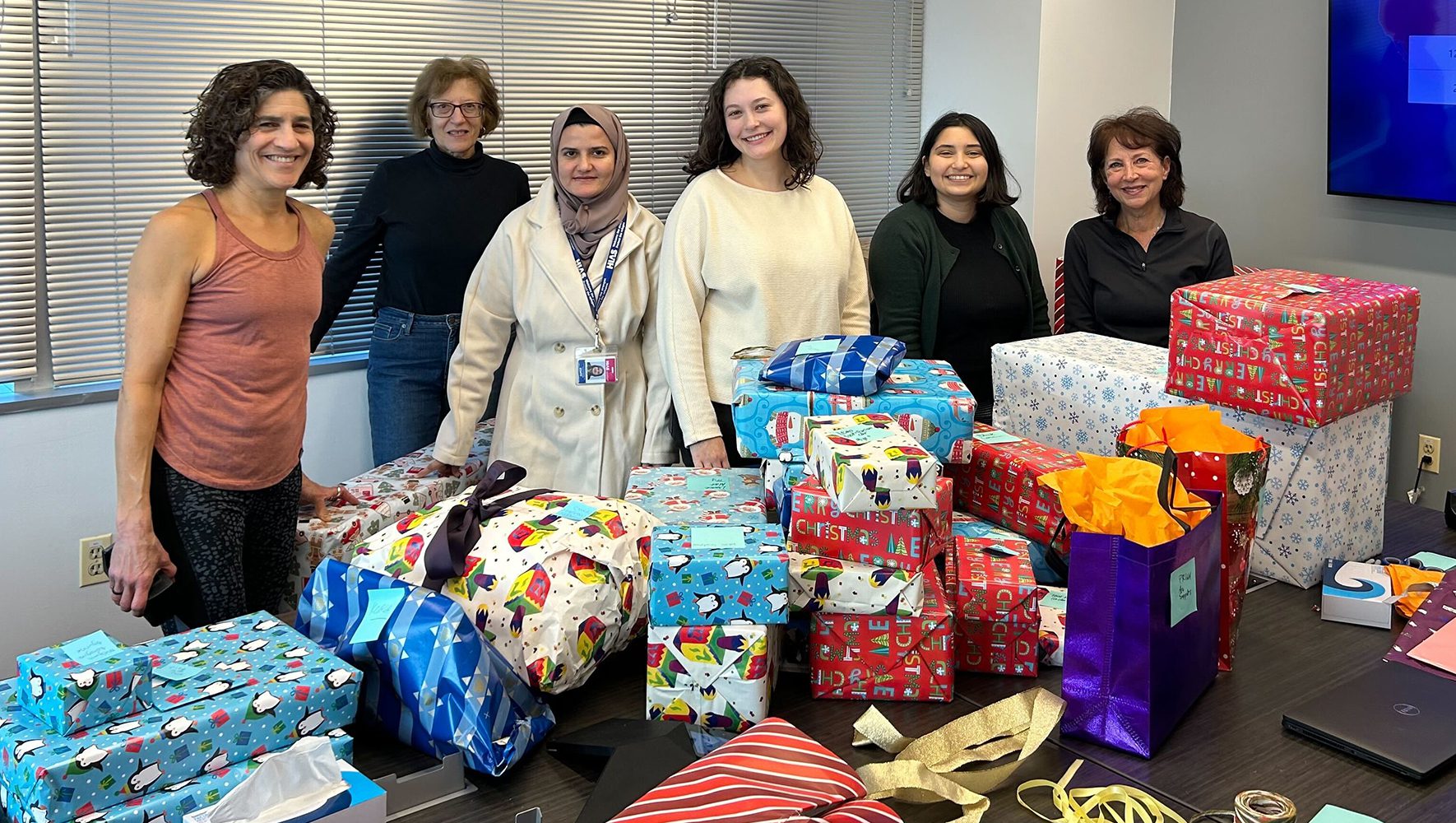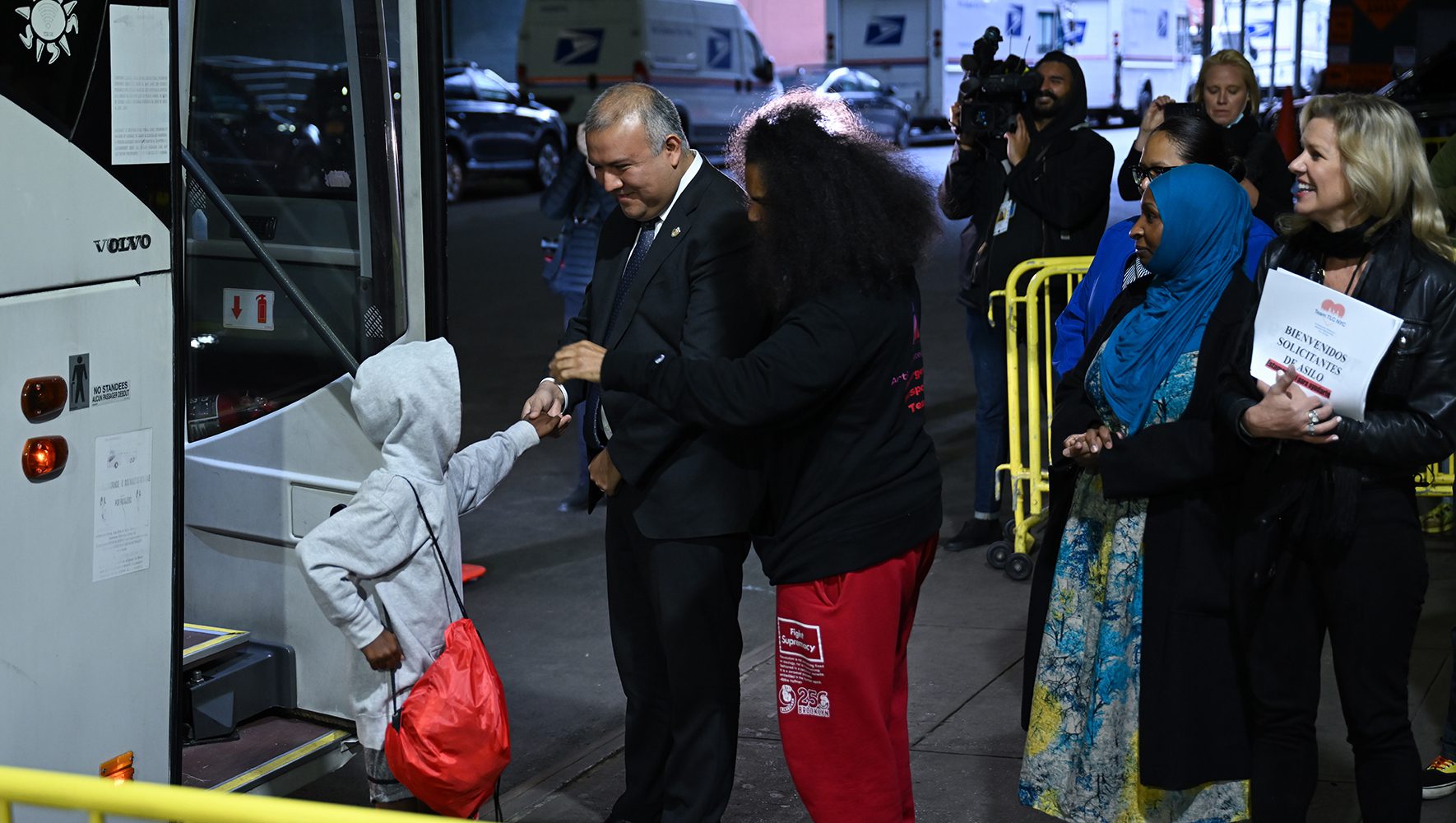HIAS Volunteers in Their Own Words: Part One
Apr 17, 2018
In honor of National Volunteer Week (April 15 - April 21), HIAS is celebrating the invaluable contributions of our volunteer network. Welcoming refugees and asylum seekers to the United States would not be possible without the tireless efforts of the thousands of volunteers across the country.
Below are brief accounts by four HIAS volunteers who serve refugees and asylum seekers in Washington, DC and New York, describing their involvement in their own words. To read more entries in this series, click here.
Monita Buchwald
Volunteers with an asylum-seeking family from the Central African Republic in New York City.
 My role is to help the parents and their five children adjust culturally, to provide assistance with day-to-day NYC life, and to offer opportunities to experience the fun side of the city.
My role is to help the parents and their five children adjust culturally, to provide assistance with day-to-day NYC life, and to offer opportunities to experience the fun side of the city.
My focus has been on helping the father improve his spoken English so he can get a job to help support the family and enable them to move from a family shelter to their own home. Because I am a volunteer at the Metropolitan Museum of Art, I've also arranged family visits to that museum and others. Working with this father and his family has had a profound impact on my life.
Despite all the obstacles he and his family have faced, he continues to be upbeat, optimistic, and grateful for the opportunity to be here. Without shame or embarrassment he shares with me the challenges his family is facing here. And with pride and passion retells why they had to flee his country and his hopes for returning one day.
I have always been committed to the concept of tikkun olam, or repairing the world, and taking responsibility for giving back to my community and others in need.
As the Syrian refugee crisis reached unthinkable proportions in early 2017, I sought ways to welcome and support refugees—from any country—in the United States.
My volunteer work at HIAS began with creating materials about resources offered to refugees and asylum seekers; identifying public meeting spaces where volunteers could meet with their "clients;" and running a fundraiser on gofundme.com to purchase Metro cards so HIAS clients could more easily meet with their HIAS volunteer.
For the family I’m currently supporting, our worlds and experiences are so different, yet when we meet, we can connect like old friends. His most important goal is to get a "now" job; one that will enable him to provide the support he wants for his family. But together we are also trying to find ways for him to reach a bigger, perhaps loftier goal, to leverage his expertise and experience as an agricultural expert. We work on finding professionals from his past with whom he can re-establish connections.
Though the family speaks English well, communicating via email or text is shaky and not always dependable. There are also times when I want to solve the financial problems by just stepping in and providing the support.
To overcome these challenges, I've learned to communicate clearly; be patient; adjust to meet their needs; respect their situation; and manage my own expectations. And I'm continually inspired by the message: My People Were Refugees Too.
Sean Siperstein
Has been volunteering with HIAS for over six years in the Washington, DC area.
 It’s amazing how the little things can pull you in, and directly connect you to your values and heritage in unexpected ways.
It’s amazing how the little things can pull you in, and directly connect you to your values and heritage in unexpected ways.
I got involved in HIAS by happenstance. I met volunteers Nathaniel and future HIAS Board member Alexis Ortiz at a 2011 Shabbat dinner promoting the DREAM Act. I’d heard of HIAS before and had a longstanding interest in its mission, but it was my mother’s voice some weeks later—after I’d attended some other events and volunteer opportunities—that sealed it: “Oh, HIAS!”
It had belatedly sunk in that the Jewish refugee advocacy group I was telling her about is the same organization that helped my great-grandparents—and had been one of her beloved Grandma Jennie’s go-to volunteer organizations.
Volunteering with HIAS has been amazing, from letter-writing with asylum seekers detained at an isolated jail in Alabama, to lobbying White House officials, to talking politics with a citizenship student from El Salvador who had worked in construction at that same White House.
Amid the sometimes-drudgery of a legal practice that finds me reviewing documents on a screen all day, it has been a meaningful respite. Yet I keep coming back to the candlelight vigil HIAS Action DC organized at the White House last year in the wake of the administration’s Muslim and refugee ban, as we told our own family stories of finding refuge from persecution and hate.
Standing in that place and time, holding up my mother’s photograph of Grandma Jennie and Grandpa Joe, and sharing the experience, opportunities, and values that had been passed down to me, was one of those moments where I had to pinch myself afterwards.
Family is everything to me. And with HIAS’ mission to continue the welcoming of people seeking refuge that marks America and Jewish tradition at its best, I’m always truly at home.
Elaine Dancis
A former HIAS client who was resettled to the United States in 1990, is now a volunteer based in Washington, DC.
 I was born in Kiev, Ukraine and moved to the Republic of Georgia in 1979. In 1989, when Georgians were fighting against the Soviet occupation of their homeland, as a single Jewish woman from Ukraine speaking Russian I was in a very dangerous position. I greatly feared for the safety of my 13-year-old daughter and myself.
I was born in Kiev, Ukraine and moved to the Republic of Georgia in 1979. In 1989, when Georgians were fighting against the Soviet occupation of their homeland, as a single Jewish woman from Ukraine speaking Russian I was in a very dangerous position. I greatly feared for the safety of my 13-year-old daughter and myself.
We were able to leave Tbilisi on October 1, 1989 and flew to Austria. When I got off the plane In Vienna, as the head of my small household, I had to leave my daughter and all my belongings with other immigrant families as I was required to find out what the next steps in my journey would be.
Suddenly, I felt all alone in the big world, but HIAS took us and all the other refuges in, supported us, sheltered us and provided us with everything necessary to complete what turned out to be a four month journey from Austria through Italy to our final destination of Philadelphia, Pennsylvania.
It has been a long journey and a second chance in life from the day I came to this country on February 1, 1990 to my retirement last summer from Thomas Jefferson University hospital where I worked for 19 years as a Senior Programmer and Systems analyst. If not for HIAS, my life would be very different. I believe I may not even be alive today.
As I approached my retirement date, I started to think about my 27 years in America. I came here with $250 in my pocket and a 13-year-old daughter and neither of us could speak English. I learned the language and a new profession. I brought over my brother and his family, found him a job and I have no debts. I got married and created a loving home. My daughter is a Math teacher in high school and is safe and with a family of her own.
I decided to volunteer much of my free time to do what I can do for HIAS. I’ve been participating in rallies supporting refugees. I contacted HIAS and found out about their new volunteer program supporting asylum seeking refugees and a monthly letter-writing program to offer compassion and solidarity to asylum seekers in U.S immigration detention.
I immediately signed up and I feel I will be helping other refugees, like myself who feared for their lives. I’ve been in their shoes and can relate to their needs and struggles.
Arthur Reed
A volunteer ESL Tutor in New York City, one of the first to work with HIAS clients in New York.
 I received a flyer from a friend who had received it at her synagogue, it indicated that HIAS was looking for volunteers to help in various mentoring positions such as job placement, neighborhood orientation, conversation, English language support, and letter-writing to refugees.
I received a flyer from a friend who had received it at her synagogue, it indicated that HIAS was looking for volunteers to help in various mentoring positions such as job placement, neighborhood orientation, conversation, English language support, and letter-writing to refugees.
I had not known that part of this outreach was an expansion of services. Exciting and challenging and a special opportunity are thoughts that come to mind as I reflect on that time.
To be in one of the first orientation groups and groups who received a perspective on the work that was to be done was thrilling.
The challenge of being asked to contribute my thoughts about the program because it was at its initial stages, allowed me to consider what those working in the program might need to know and what best practices might be appropriate.
This gave me a chance to reflect on my experiences over past years of doing this type of work as well as the questions I had had during my time doing it. It made me a stronger and more capable person. The opportunity to discuss, refine, and expand through the contributions of others in a non-judgmental manner made the process a pleasure.
Each meeting taught me more. Expanding my knowledge and abilities through doing and speaking with others was, and remains, a growth experience that I treasure. I have now been present at several orientation groups for volunteers and I find that each meeting gives new perspective and reinforces the belief that there are many who desire to help those in need and are looking for an avenue such as HIAS to help them do it.
Over the time that I have been mentoring for HIAS, I have had two mentees with whom I have worked. The profound need and desire to find a bridge to their new life is powerful. They work hard. They want to be successful in their new lives. They are animated by a desire to be independent and integrate into the culture they have found in the United States.
These are, at times, a struggle in learning about diverse populations in the United States and the different expressions that free speech makes possible. I feel that I am part of that bridge to a new opportunity of integration and understanding as well as a part of the long process of finding stability in an unstable world. Not only the work that one does as a mentor can be seen as rewarding and a support for this, but simply the fact that there is someone who is willing to be of help and try to understand some of the obstacles that each person faces forms a sense of community and care that is indispensable for entering a new world.
We, who have lived in this society, often take for granted many things as norms or rules that are not written down. To have someone who is present to support this transition may be the greatest gift of all.
The beginning of amplified communication through the use of new words or phrases, the formation of a bond that is, in some cases, a connection to a world of a different language and a larger community, the expression of concern when I was ill by those with whom I was working, all showed the value of ambassadorship through this work. It is not only the work, but the expression of empathy and concern that allows those with whom we work to know not just through words but through deeds, that people are concerned about their situation as they try to find a place in this culture.
Simply being caring, and supporting through helping these individuals advance their desires may be one of the greatest products of the work. This is the form of giving that cannot impoverish and the withholding of which never enriches. To be able to meet and learn about others enriches my life in a myriad of ways and without which I would be the lesser.
Interested in learning more about volunteering with HIAS? Check out our volunteer page. And to read more about refugees and the communities that welcome them, follow HIAS on Facebook, Twitter and Instagram.


